Soul searching with TREEHOUSE’s Chef Christian Mongendre
TREEHOUSE founder Chef Christian Mongendre sat down with TMS to dig into his culinary vision.
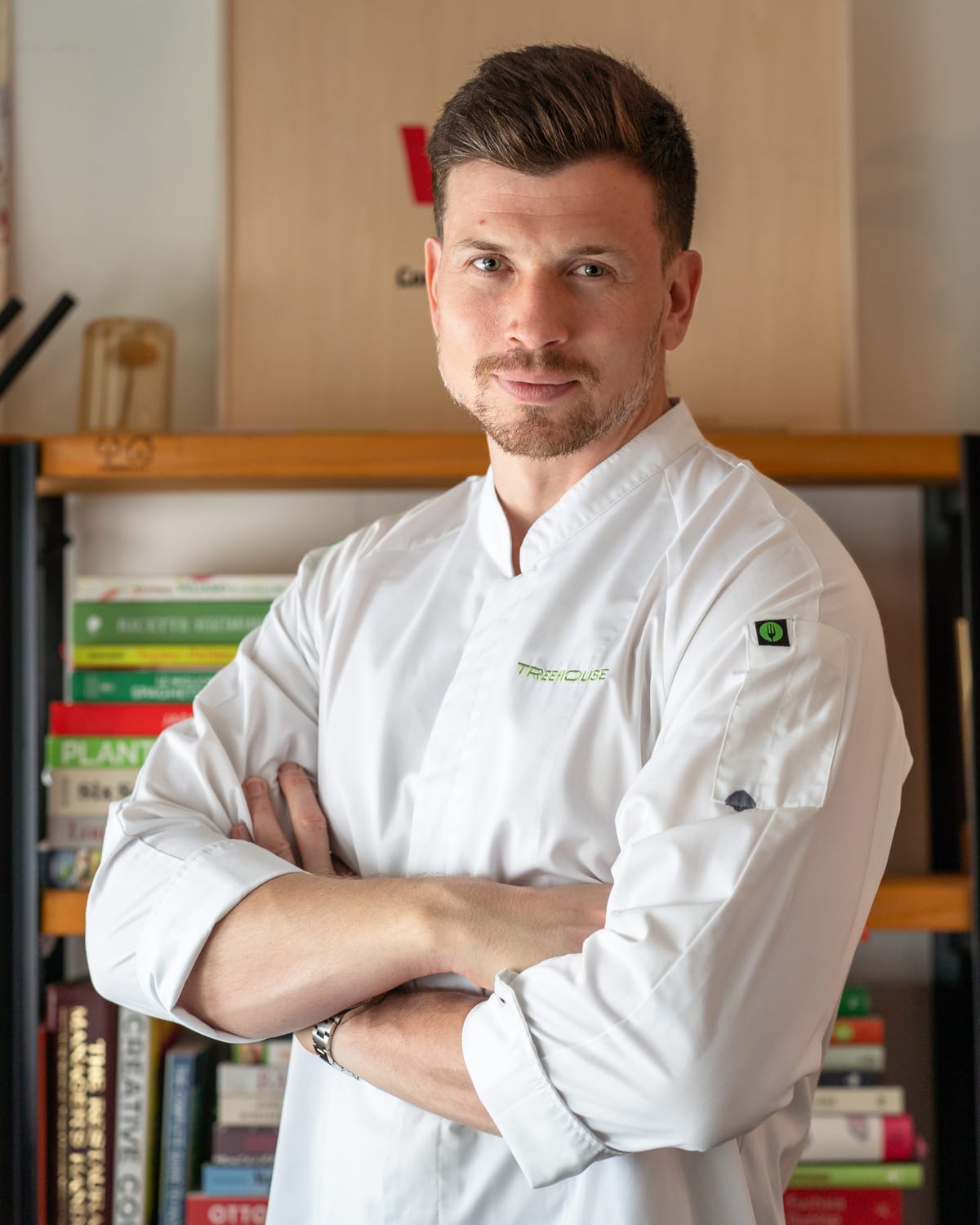
A few minutes every morning is all you need.
Stay up to date on the world's Headlines and Human Stories. It's fun, it's factual, it's fluff-free.
With locations extending from Central, Quarry Bay, Causeway Bay and Kai Tak to Tsim Sha Tsui, Hong Kong’s TREEHOUSE is redefining “fast food” with nutritious, whole plant-based meals made quickly but with love. With a toothy smile and a soft-spoken voice, TREEHOUSE founder Chef Christian Mongendre, wearing an eco-cotton TREEHOUSE uniform, sat down with TMS for an exclusive interview to dig into his culinary vision.
“When people ask me what I do for a living, I always say I sell veggie burgers,” says Mongendre. From using natural dyes for TREEHOUSE’s uniforms and sustainable ingredients and materials in the restaurant to composting and planting trees, Mongendre and his team are on a mission to provide high-quality food made from scratch with eco-consciousness at the forefront of their operation.
“No preservatives, no weird stuff, no highly processed items,” emphasizes Mongendre. With a vision to create exciting foods that are available quickly, “We try to do our best to create a wholesome environment,” he says. “For everyone to feel included and to provide the best food that we can.”
An environmental upbringing
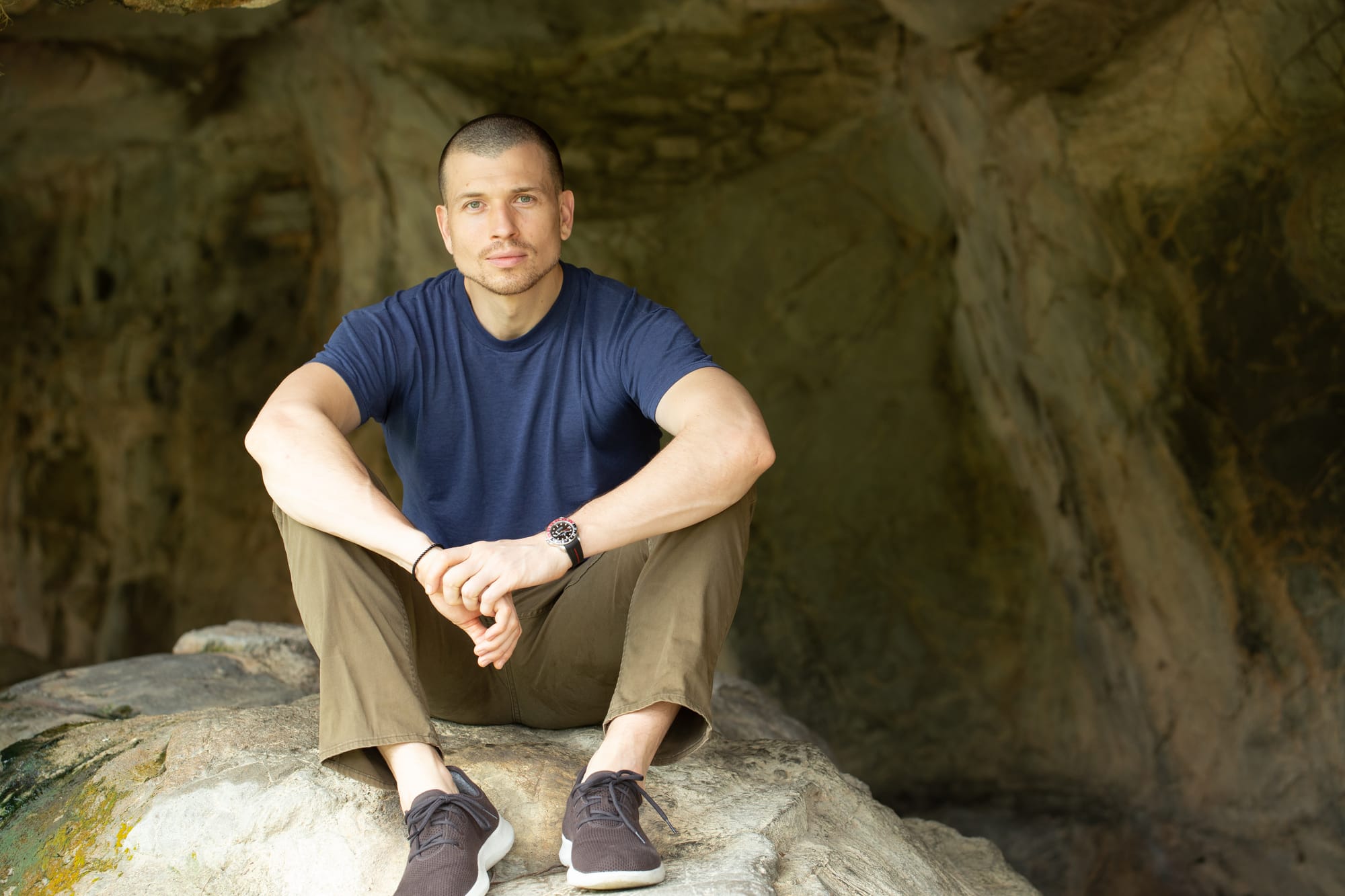
Mongendre reminisces of childhood memories on Christmas Day – getting dressed up, feasting on homemade delights made by his mother and father, gathering around a warm fire an,y stories.” The jokes and laughter that came with it, as well as the warmth of that environment, are the core of Mongendre’s upbringing.
His upbringing also shaped the bond he shares with the environment today. Once, he was caught fiddling with a leaf and breaking off parts of a tree, and Mongendre’s father told him, “No, you should be careful. We rely on the environment.”
Although they lived in Paris during the week, his family stayed at their renovated 1800s property in the countryside on the weekends, where they had a small farm. Having his parents bring an earthly warmth to his childhood left a big impact. “It really kind of opened my mind and made me understand how important the natural environment was,” says Mongendre. It was also all about quality foods. They didn’t eat red meat, only chicken that they got from nearby farms. They also raised their own animals, including keeping chickens for eggs. But he was soon drawn to deeper questions about food
“Very quickly, I didn’t understand why all these animals that I love so much, sleep with and have around, why I would eat them,” Mongendre says. Not only that, but the other question was: “Why were some OK [to eat], and some not OK?” At first, he never understood why his family didn’t eat red meat but ate chicken. He didn’t understand why one thing could be picked over another.
Find the diet, find oneself
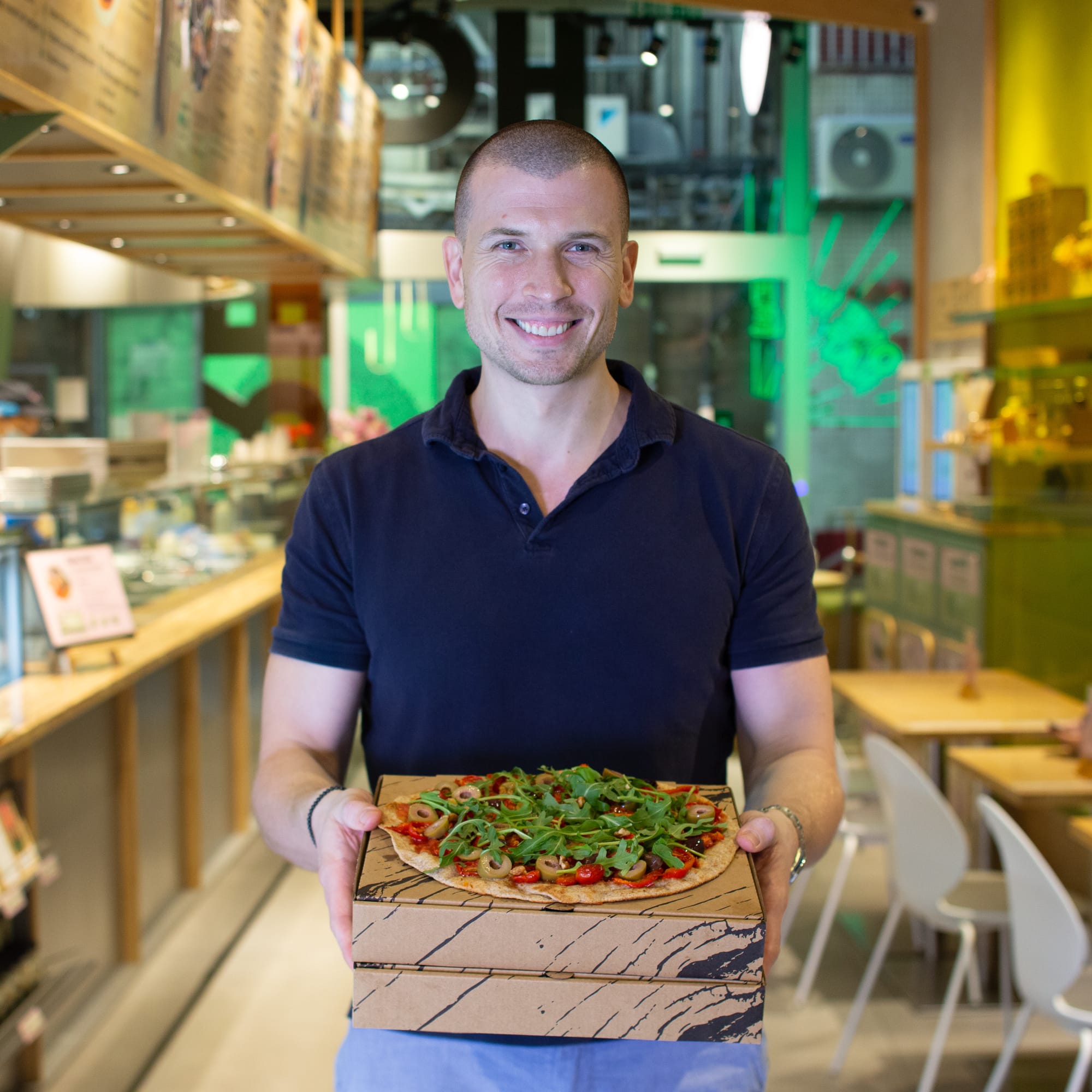
Born in Hong Kong, then moving to France at the age of 3, and then living in the US for high school and college, Mongendre did a hefty amount of bouncing around during his early years. Growing up as a multicultural kid, he didn’t always feel like he belonged. “When I’m in America, I feel more French. When I’m in France, I feel more American,” he says. Because of that, “I always felt like an outsider,” recalls Mongendre.
But being a multicultural kid wasn’t the only stumbling block during his school years. The rigorous French schooling system was difficult for Mongendre with his attention deficit hyperactivity disorder (ADHD). “I got kicked out of a few [schools], I think I changed 15 schools.” After a beat, he estimates, “Maybe 11 to 15 schools.”
The switch to the US brought more stability, with the whole listen-and-copy regimen thrown out the window. He found that by honing in on subjects and teachers he cared about, he started excelling in school. “Because I was allowed to choose, there was more responsibility. So I actually became really good in school,” he says. The US is also where he started experimenting with sports and learned about his athletic ability. After trying everything from tennis to soccer to rugby, Mongendre found a love for rowing. “When I found sports, I found identity,” he says. He was no longer the “Frenchy or the American,” he was an athlete.
He quickly rose to the top ranks and was ultimately recruited for college. Being an athlete meant paying close attention to his diet. It may be easy to think, “We’re athletes, we’re fit, so we can eat what we want.” But that's a no for Mongendre. Once he was pursuing the sport at the university level, he started experimenting with his diet. “What I put in my body must have an effect,” he thought.
A switch to a plant-based diet brought more than physical benefits. “I experienced all these other things that I didn’t know were going to open up. Like a lot more mental clarity,” he explains. “My recovery rate, my compassion for others and for the bigger picture. So the fuel conception of food was my first understanding around food,” says Mongendre. Food is fuel, after all.
Did his newfound diet mean some stares from peers? Yes. Real men eat steak and drink beer, a trope we’ve all heard. One that Mongendre has, too. “Well, I was like the weird guy that brings his own veggie burgers at the barbecue,” he says with a smile and a shrug.
With meticulous research came a growing passion. “All the research, everything I was reading, plus everything I was experimenting with was giving the results that I liked,” he says. “Also, I realized that I liked to feel special in that aspect. Having this differentiation from others was my identity that I didn’t want to be normal.”
But after studying business and film during his university years, his college career was cut short when his mother was diagnosed with cancer. He decided to head back to France to be closer to her, where he also enrolled in culinary school, the Institut Paul Bocuse in Lyon.
Mongendre recalls being as young as 16 when his “obsession” with a new budding business model of quality accessible foods began. Something like McDonald’s in access and reach, but with a much higher quality product. “When I would go to restaurants or I would go to F&B venues, I was always wanting to be the one who created it. Rather than be the one who’s enjoying it,” he says.
En route to the “veggie burger”
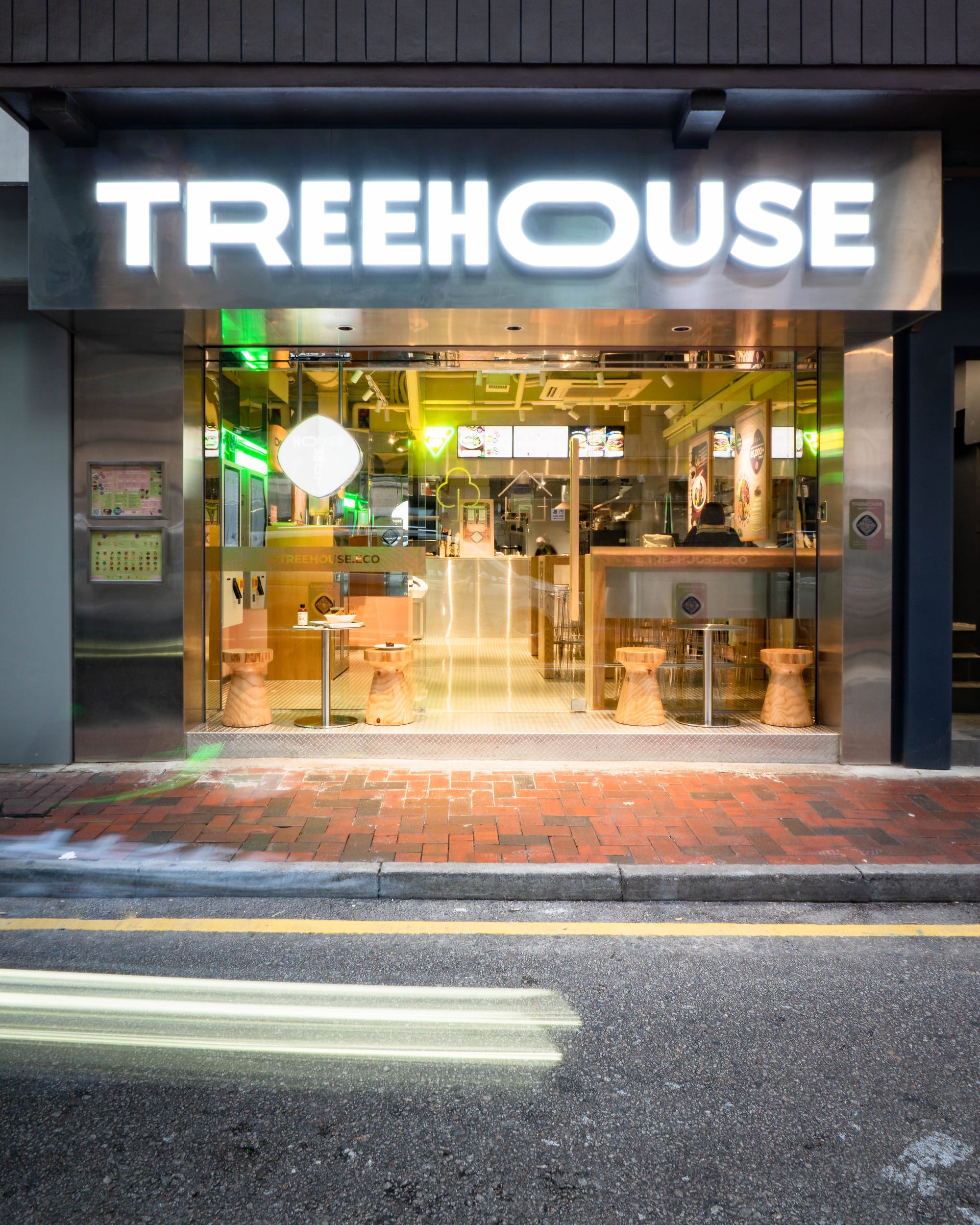
In his early 20s, he sadly lost both parents in a short time frame. “Her passing made it more that I needed to focus on other things, so I went to kind of soul search for a year.” He spent some time traveling around India, Thailand, Nepal and Vietnam.
“I saw it as a powerful, transformative thing for me to be so free, and with that freedom came all that responsibility, and I had to put my own boundaries, my own laws, my own values into existence, and it really helped me shape who I am today and the values that I have.” The loss of his parents, though devastating, underscored for Mongendre the importance of searching for internal validation over external. And, of course, food was still a passion.
“Obviously, throughout that whole time, I was trying all these vegetarian restaurants everywhere,” he says. “I was experimenting with all these different flavors and so on.”
Years later, after a double bachelor’s and five years of experience at culinary school and traveling throughout Asia, Mongendre would soon be en route to directing his own operations. “I kind of always intended to work for myself,” he recalls. “It was just, they offered me a job that was too good to pass on that made me come here [Hong Kong], so I was like OK, let’s try it.”
With a laugh, Mongendre recalls that unlikely job as a general manager of a steakhouse. “Loved the city, hated the job, so I left the job,” he says with a chuckle. “As a mostly vegetarian person, it didn’t really fit my ideologies,” he admits.
Once leaving the steakhouse, Mongendre jumped around several F&B business models and several shared ventures, along the way encountering various conflicting values and styles. But he’d found another learning experience in this endeavor. “I’m really not a big fan of working for clients,” admits Mongendre. “I prefer working for myself … when it’s for myself, it’s very motivating.”
From Mana, his first venture in Hong Kong, to a restaurant in Portugal, and after a few years of consulting, Mongendre was ready to launch TREEHOUSE in Hong Kong in 2019.
As for his own business model, the crux is all about quality. Much like what he’d learned in his formative years. He got to refine that idea with Mana. “It was like, OK let's do this small place all made from scratch, and let's see how Hong Kong people respond because they want that fastness. But let's see if we can provide them that quality in that time.”
For TREEHOUSE’s lineup, this focus on quality means everything organic. Whether it’s tofu, rice, eggs or quinoa, with the help of local and non-local suppliers, the TREEHOUSE shelves remain stocked with the best of the best whole ingredients. “We use a very high-quality oil from Italy. All our breads are made with organic flour from Germany,” says Mongendre to illustrate.
“We're continually trying to get better produce, always evolving and testing new things. And that's where we're proud is that we're always improving and not decreasing the quality.” The TREEHOUSE experience is focused on “food that is good for people and that people can come back again and again and build trust,” he says.
Maintaining human connection through food
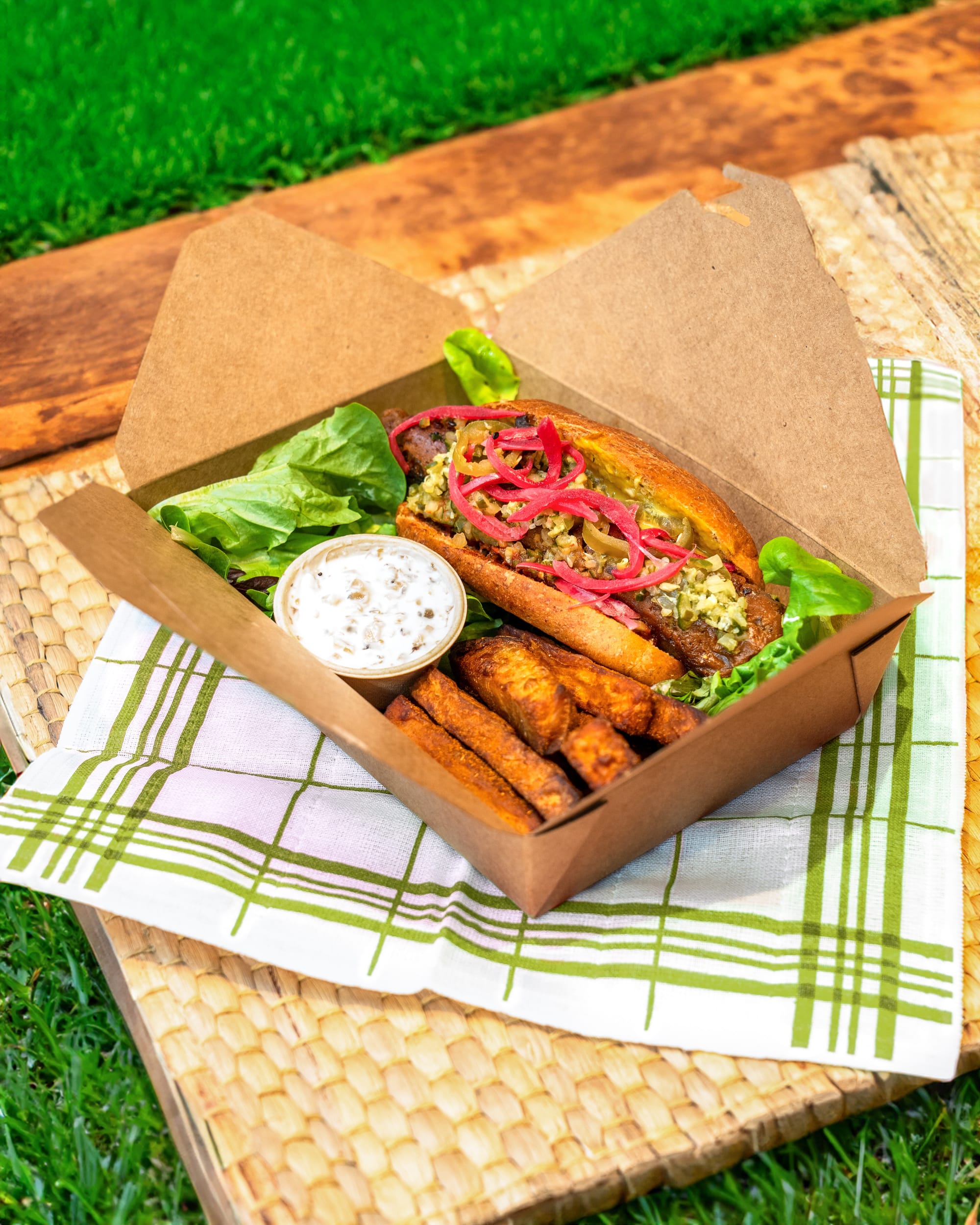
So, how exactly does Mongendre approach his plant-based lifestyle? What does his passion for food mean? It’s about connection, both with his body and with others. “So, I’m pretty much vegetarian. But, I don’t disallow myself to have anything. I don’t want to be bound by my own laws as well,” says Mongendre.
“If one day I get stuck in an airport, and I have to have McDonald’s? Enjoy it, and really reconnect to that little child who used to love McDonald’s. And don’t feel bad about it,” he adds with a shrug. “Then the next day, you go back to your normal thing.”
Inclusivity and an open ear not only to your own perspective but that of others is, to him, what starts a worthwhile conversation. “It’s really not about being perfect; it’s to be as open-minded as you can,” he says.
“I think the biggest thing that I like to keep is to respect the human connection,” says Mongendre. He paints a picture, “Let’s say you have me over, and your grandmother has cooked a beef broth and she’s spent the whole day cooking it,” he starts. “And I come and I’m like, ‘Oh no, sorry I’m vegetarian.’ This breaks the human connection. It breaks the wonderful bond you create over food,” says Mongendre.
TREEHOUSE has likewise looked to nurture a strong connection between its wholesome, heartfelt dishes and the city itself. For example, they’ve introduced the Chinese language to their social media platforms, menus and ordering platforms, and the chain has branched out to Asian-inspired dishes as well. “We’re really trying to bring this cause to Hong Kong,” says Mongendre.
Mongendre and his team have always kept customers within personal reach. “I’m niche, well, I’m a bit too out there,” he acknowledges. “So it’s important to bring a product that is a little bit ahead of the customer, but not too much ahead that they don’t understand it.” The result is something more profound than your typical fast food experience.
As for the veg-curious, Mongendre stresses research as a good jumping-off point. “Being vegetarian doesn’t mean you’re healthy. Being vegetarian doesn’t mean you’re better than anyone else. Being vegetarian doesn’t always mean you’re making an impact,” he says. “I think it’s about really understanding how the food interacts with you.” Through research and self-regulation, it’s about understanding what your body wants and needs. “It’s about you building a relationship with that diet,” says Mongendre.
“I found that in food, there are no shortcuts. There's not a power bar, there's not a protein powder, there's not a supplement that is going to make up for good quality whole foods.”




Comments ()